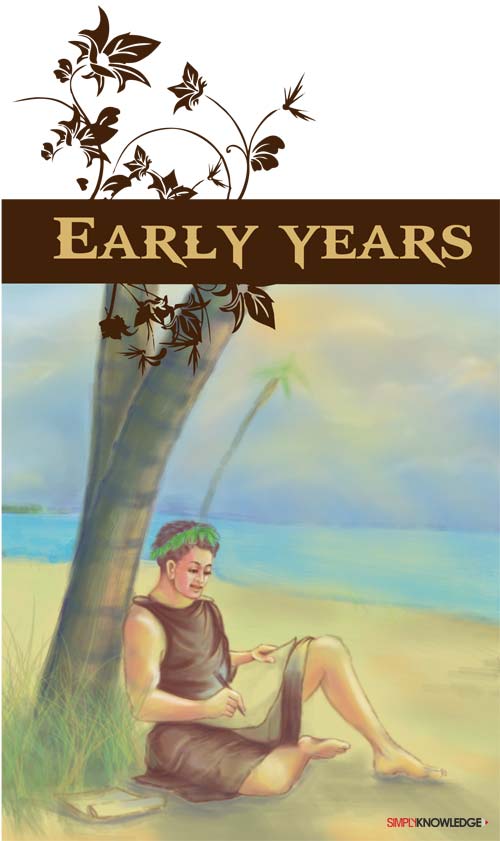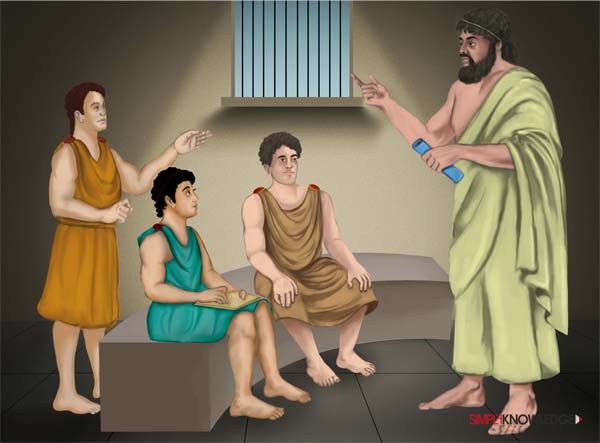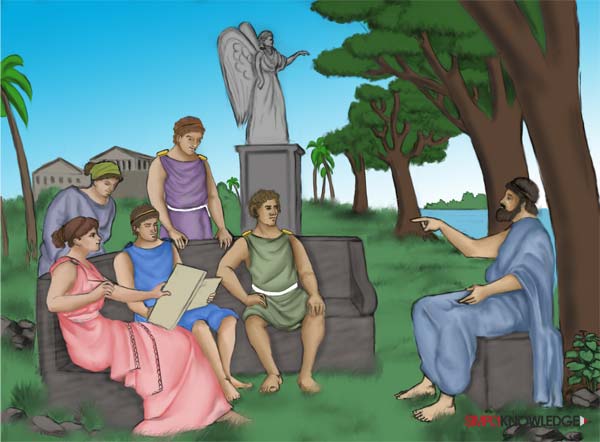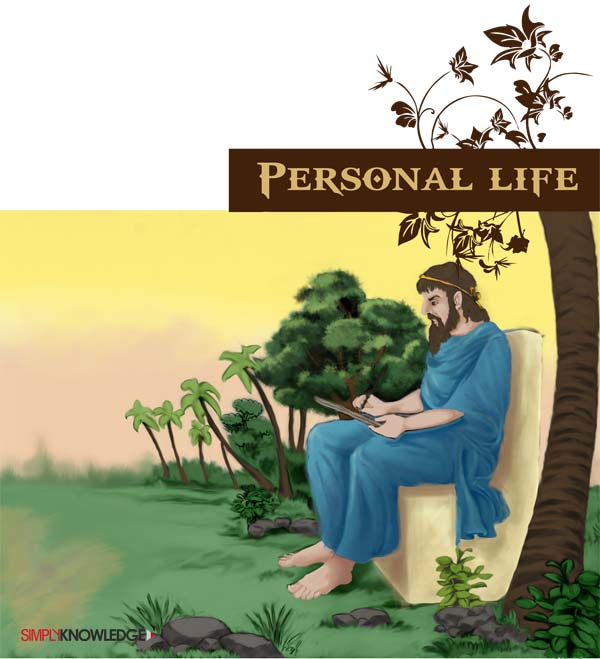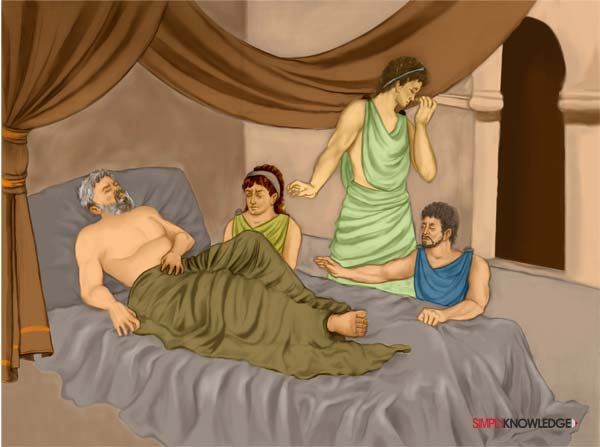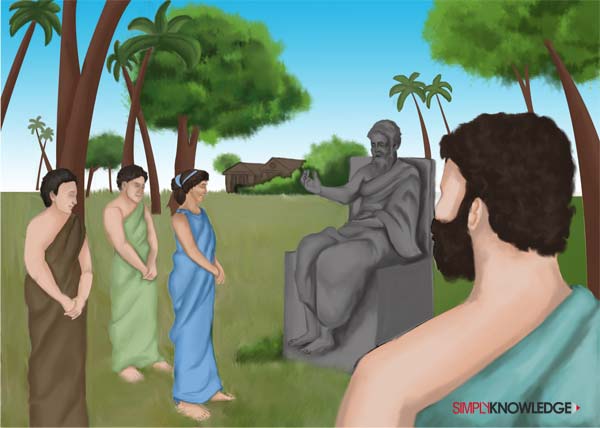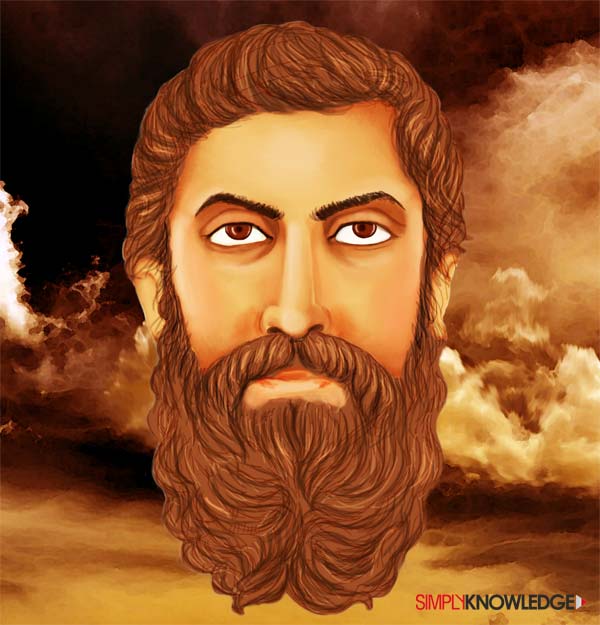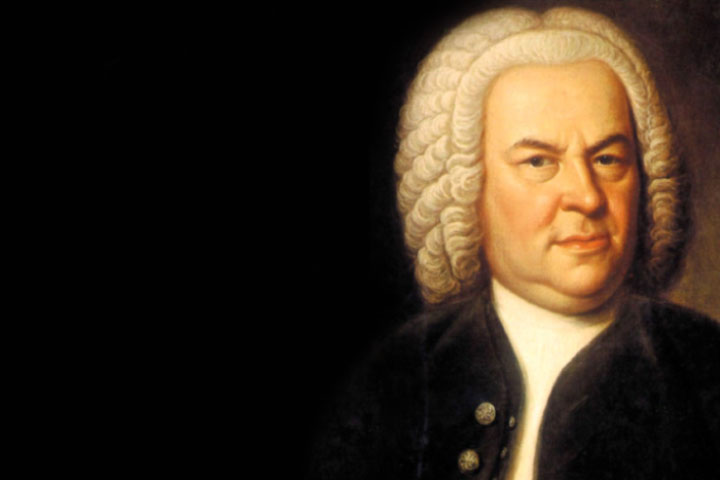
Introduction
“If God listened to the prayers of men, all men would quickly have perished: for they are forever praying for evil against one another,” said Epicurus, an ancient Hellenic thinker. The words did not emanate from any figment of rabid or ethereal imagination. Instead, they explicitly express our thoughts about wishing evil for everyone with whom we cross daggers.
These words are indeed atheistic. They free humans from the fear of a divine, supreme power that can be broadly termed ‘God,’ as defined by extant religions. What led Epicurus to make such a profound statement about 2,300 years ago can be elucidated only by a deep insight into his life, thoughts, teachings and circumstances prevailing during his time.

Birth
Epicurus was born in 341BC on the Aegean island Samos in the Mediterranean Sea, which was part of the Athenian empire. His father Neocles, and mother, Chaerestrata hailed from aristocratic Athenian families.
The date and place of Epicurus’ birth are vital to understanding his psychology and its evolution over years. Epicurus was born some seven years after the death of Plato, who had expounded Socrates’ principles embellished with a few of his own experiences and thoughts. Plato’s disciple, Aristotle, was the most prominent thinker of the time, who practiced from his famous institute, the Lyceum, in Athens. Various forms of thought and psychology existed during that era of ancient Athens, with each vying for popularity among masses. Hence that period was considered the crossroads for Athenian thought.
Early years
Epicurus’ parents had relocated to Samoa from Athens much before his birth. The move was because Athenian royals were entitled to receive large plots of land on islands such as Samos, as their reward for serving their country. Hence, Epicurus as a child played and studied with the kids of other nobles. And like all students, he studied at an exclusive school for nobles on Samos, learning subjects peculiar to the times, such as history, religion, music and mathematics.
His teachers did not find any specific or unique traits that could have distinguished Epicurus from other students. But in solitude, the young Epicurus would devote time to writing his thoughts on a variety of issues, mainly influenced by plenitude, since his family was affluent and well respected on Samos.

Teenage
Over the years, Epicurus became increasingly interested in thinking about ethereal issues such as spirituality, the difference between right and wrong, material possessions and vicissitude and epistemology- the understanding of one’s own knowledge in context to its origin, methods, causes and limitations. As a result, his parents sent him to study under Pamphilus, a neo-Socratic teacher on Samos. He studied various schools of thoughts, especially those expounded by Socrates, Plato and Aristotle for over four years. Epicurus also learnt concepts of mathematics and atoms with perspectives of their relations to human lives, from teachings of mathematicians and scientists including Pythagoras and Democritus.
At the age of 18, Epicurus was conscripted into the Athenian army. He served as soldier for about two years. He is not credited with having fought any battles since Alexander the Great of Macedon, who reigned at the time, had secured Athens’ borders by defeating archenemies Sparta and later Persia, as part of his conquest to expand the Athenian empire. Epicurus was discharged from the Athenian military in 323BC.

The Tide Turns
Upon discharge from the army, Epicurus faced tough times ahead. Alexander the Great died of war wounds and illness in Babylon in 323BC. Athens came under the rule of General Perdiccas, a faithful follower of the deceased Macedon emperor. Perdiccas issued a decree requiring all Athenian settlers on Samos to return to Athens. Thus, Epicurus’ family relocated to Colophon.
Epicurus had planned to study under Aristotle at the famous Lyceum but his dreams were quashed for two reasons: He is believed to have met Aristotle at least on one occasion. The supposed meeting was unsuccessful since Aristotle bluntly rejected any ideas about human psychology that associated itself with treasures and pleasures. In 322BC, Aristotle passed away due to natural causes. Disgruntled at these developments, Epicurus left Athens to reunite with his family in Colophon.

Fortune smiles upon Epicurus
The city of Colophon opened new vistas for Epicurus. Here, he joined the school of Nausiphanes, renowned for his teachings based on thoughts of Democritus. As a child, Epicurus had learnt about thoughts and theories expounded by Democritus, a Neo-Socratic thinker. Nausiphanes encouraged Epicurus to evolve his own thoughts based on Democritus’ teachings, which included atomic hypothesis- the world is ruled by atoms, epistemology, politics and science, mathematics, anthropology, biology and cosmology.
These helped Epicurus form his own teachings which he would later teach through his schools.

Epicurus forms his own schools
Armed with new ideas and theories about human thought, Epicurus left Colophon in 310BC and began teaching informally in Mytilene. However, locals and nobles viewed Epicurean ideas with utter disdain and he was forced to leave the city. A couple of years later, Epicurus formed another school on Lampsacus but abandoned it for unknown reasons and returned to Athens in 306BC.

Life in Athens
Epicurus’ decision to move to Athens was promoted by two main reasons: The Hellenic capital was home to two major schools: The Stoa- established by Zeno, the founder of Stoicism, whose thoughts about human behaviour were similar to those cherished by Epicurus and The Academy- founded by Plato- based on Socratic thinking, which expounded virtuous living based on true knowledge. Between these two prominent schools, Epicurus formed his own learning centre, aptly called ‘The Garden’.

The Garden
The Garden was a unique school in many aspects. It was a privately owned place, bought by Epicurus and was renowned as being “pleasurable”. The location was outside Athens and the river, Eridanus, flowed nearby. It boasted of groves and flowery plants, comfortable marble benches and magnificent statues, which induced a sense of well being among students. It created an ambience of prosperity and enjoyment. Students and followers of Epicurus could retreat into the serenity of the place, away from buzzing Athens.
“I have never wished to cater to the crowd; for what I know they do not approve, and what they approve I do not know,” he said, when asked about The Garden and its flamboyant departure from traditions of other schools such as Aristotle’s Lyceum, Zeno’s Stoa and The Academy of Plato where followers lived on threadbare resources and led a hermetic life.

Rise to Fame
The Garden gained immense popularity due to Epicurean teachings on prosperity and pleasures, unconventional thoughts about Gods and creative ideas about science. The gate of The Garden bore the inscription: “It is ideal to dwell here because here we hold pleasure as the supreme”, signifying Epicurean thoughts about happiness and its pursuit as the sole good in life.
Epicurus laid great emphasis on community life and friendship as means of pleasure. Hence, students at The Garden lived like a large family or community, with hierarchy well defined by Epicurus. He also made students undertake an oath owing allegiance to Epicurean thoughts. “Nothing is enough for the man to whom enough is too little,” he would often tell his students.

The students
The Garden was the first school of its kind in ancient Athens that enrolled female students. The first students of The Garden included Hermarchus, who succeeded Epicurus as the head of the school and wrote extensively against Plato and Aristotle,Idomeneus who had funded the property for Epicurus, Leonteus and his wife Themista, who named their son Epicurus in honour of their master, Colotes, a satire writer and Metrodorus, who popularised his master’s teachings after Epicurus’ death. A female student, Leontion, who wrote about Epicurus’ teachings, also studied at The Garden.
Personal life
There are no records to indicate that Epicurus married or fathered any children outside wedlock. Some historians claim he was intimate with his female student Leontion but other writers argue that Epicurus’ critics, angered by his teachings about religion and pleasures attempt to tarnish his fame through such false accusations.
Regardless, Epicurus led a luxurious life at The Garden, lecturing, debating, teaching and writing some 300 letters to his friends, disciples and other contemporary thinkers. With Epicurus at the helm, life at The Garden was also opulent.

Last days
Epicurus never undertook any adventures. Instead, he was content leading a luxurious life at The Garden and enjoying the benevolence of nobles and aristocrats who favoured his teachings. Epicurus, some historians claim, founded a cult with himself as the epitome of ostentatious living to be emulated by his followers. He hosted grand banquets at The Garden- a deviation from traditional schools that stipulated austerity. He also willed that his birthday, according to Greek calendar, be celebrated with extravagant wassails annually at The Garden. Epicurus enjoyed vintage wines from various parts of the Hellenic empire and their expensive varieties from other lands.

Epicurus’ death
The end of this thinker who gave a whole new dimension to psychology was painful albeit sans departure from his teachings about pleasures. Fond of expensive wines, Epicurus developed kidney stones caused by imbibing unhealthy volumes of the intoxicating, potent brew over the years. Friends and students had cautioned him about the inherent health hazards posed by quaffing such imprudent quantities with alarming alacrity. Epicurus cheerfully dismissed such warnings, saying “Death does not concern us, because as long as we exist, death is not here. And when it does come, we no longer exist.”
Epicurus’ Will
Knowing he could not survive the affliction and wanting to keep his legacy alive, Epicurus sent a letter to his friend and student Idomeneus, who was also his chosen heir.
“I am writing to you on a happy occasion, which will also be my last day alive. I am afflicted by a strange disability that blocks my urine while my stomach can no longer hold food. The pain is unbearable but my mind is cheerful. My mind reflects on my teachings and its implications and I implore you to propagate them. I need your help to care of The Garden and my children- your fellow students, especially Metrodorus, one of my brilliant boys. I plead you to do so to the best of your abilities and in a manner that will make a master proud about his student, with the same honesty and devotion which you bestowed on me,” Epicurus wrote to Idomeneus.
The wine connoisseur died of renal failure in 270BC. Admirers and students performed last rites on Epicurus at The Garden and erected a statue at that location to enshrine their deceased master.

The Garden after Epicurus
Epicurus’ heir, Idomeneus honoured his master’s will with utmost tenacity: He popularized Epicurean teachings long after the death of their founder, at The Garden. The exact era during which The Garden slipped into decline is unknown. Cicero, an ancient Greek historian and writer claims that he found the Epicurean school in shambles during his visit to Athens around 51BC.
Today, historians are trying to pinpoint the exact location of The Garden and other important places including Aristotle’s Lyceum and The Academy of Plato. The rise of Christianity during the Roman Empire saw several Greek monuments considered as pagan or heathen places being razed and replaced with churches, according to documented history. Development of Athens over the last 2500 years has also contributed to the exact locations of these schools being obscured in history. Hence, finding the locations of these ancient schools is rife with hurdles despite modern technologies being available.

Epicurus’ contributions to vocabulary:
That pleasure and its pursuit are the most supreme for humans led to coining of the English words ‘Epicurean’ and ‘Epicure’ which means opulently delightful and appealing to all senses. The term is commonly used to signify luxury in various forms such as gourmet cuisine, haute couture and opulent houses, among others, portraying the truest form of Epicurus’ teachings.

Epicurus’ Psychology
The bulk of Epicurean writings were destroyed over the years by religious conquistadors since they were considered blasphemous. Writers such as Cicero and Plutarch were hostile to Epicurean teachings since they contradicted several accepted Athenian traditions. Hence, historians face great difficulties while trying to piece together Epicurean thoughts.

On Atoms
Epicurus’ thoughts about the universe, human life, science and epistemology form the basis of various streams of psychology. He said the universe and everything contained within is composed of atoms that can neither be created nor destroyed. Hence, all phenomenon experienced by humans is a result of interactions between these atoms.

About Gods
Since atoms are the building blocks of the universe, Gods or divine beings cannot be blamed or praised for positive or negative occurrences and experiences of humans. Gods live in their own realm and hence have nothing to do with punishments or rewards to humans for good or bad deeds. “Justice... is a kind of compact not to harm or be harmed,” he says, when speaking about God and divine justice, contrary to contemporary Athenian religion. Gods only serve as an example of what an ideal human life should be- full of pleasure and devoid of worries of any sort, Epicurus propounded. Peace without fear was the basis of his teaching.
His alleged atheistic inclinations further echo in his saying: “It is folly for a man to pray to the gods for that which he has the power to obtain by himself.”

Life without worries
Epicurus said, a life without worries is the most pleasurable, though it may not be materially abundant. He emphasised this saying: “A free life cannot acquire many possessions, because this is not easy to do without servility to mobs or monarchs.” Through this, Epicurus aptly conveys that being supine and subservient leads to unhappiness, regardless of whether such servility is towards the public or the nobles, since each has their own demands on an individual. Such demands make a person sorrowful.

Prosperous life
Epicurus further qualifies his life without worries stemming from endless pursuit of material wealth and its pleasures. He said: “Do not spoil what you have by desiring what you have not; remember that what you now have was once among the things you only hoped for.” He explicitly warns, the intrinsic human nature of venery for more pleasures invariably causes persons to cease appreciating and enjoying whatever they have achieved, creates greater ambitions which might never be fulfilled and pitches them into the sorrowful world of competition. Once people have achieved what they hoped to, they should relax and enjoy it to the fullest. “If you want to make people happy, do not bestow them with more riches. Instead, take away their desires for these riches so they may be content,” Epicurus said to prevent his thoughts from being misinterpreted for promoting avarice.
Despite his extrinsic pursuit of happy, prosperous life, Epicurus would always exemplify that riches are not the only means to derive pleasure. “It is better for you to be free of fear lying upon a pallet, than to have a golden couch and a rich table and be full of trouble,” he preached.

Collective happiness
That humans are social animals and require a society to flourish was perhaps first expounded by Epicurus. He laid extra emphasis on community life, especially at his school, The Garden and highlighted the importance of amity. “You do not develop courage by being happy in your relationships daily. You develop it by surviving difficult times together and challenging adversity,” he taught his followers.

The Controversy
Since Epicurus’ teachings clashed with those of Aristotle and other contemporary thinkers, he was generally considered an opportunist who tried to appease rulers and aristocrats by justifying their extravagant lifestyles. Hence, several later thinkers criticized Epicurean thoughts by misrepresenting them as preaching unabashed quest for pleasures. Religious conquests, especially those based on altruism- or the concept of suffering for others by sacrificing oneself- found Epicurean teachings grossly contradictory to their doctrines and hence, derided him while destroying his writings and those of his followers. Yet, it cannot be denied that Epicurus laid foundation for materialism and the art of enjoying life to the fullest, without feeling guilty or fearing consequences of living a bountiful life, provided it is lived in conformity with societal norms.
Next Biography





